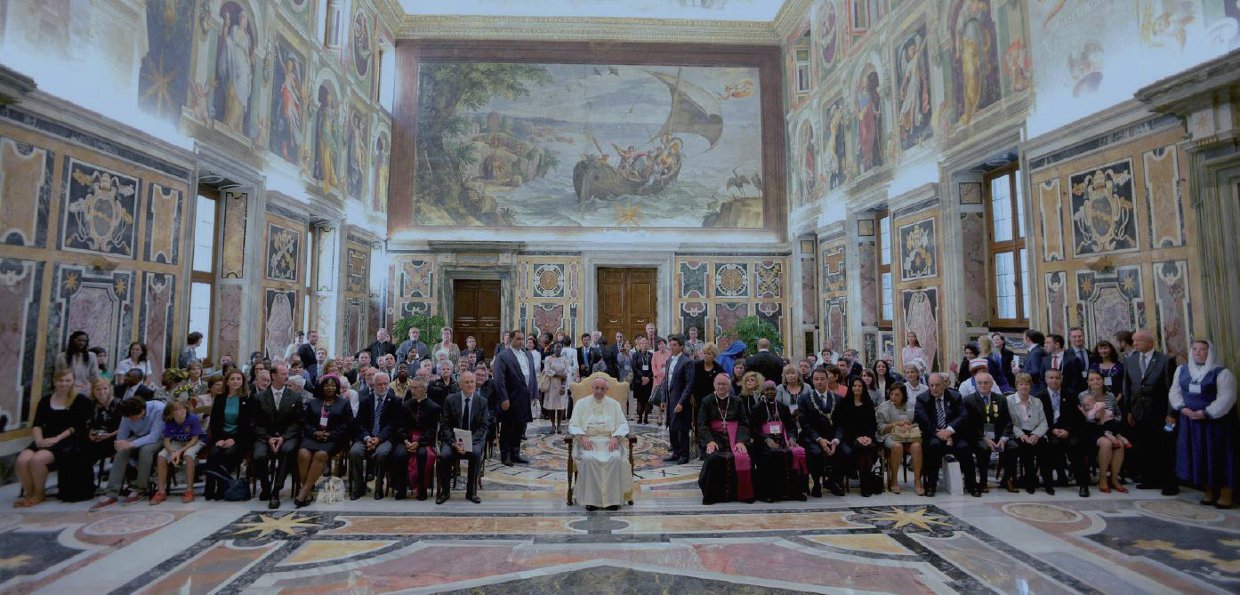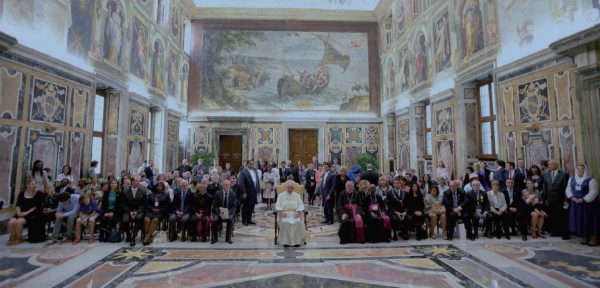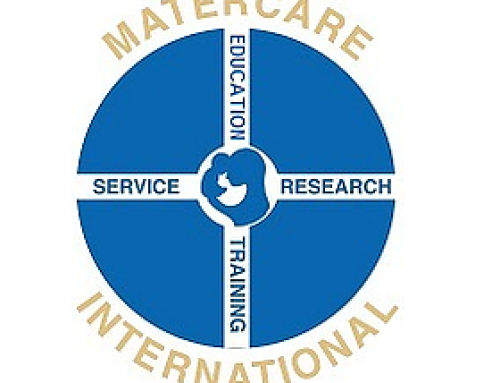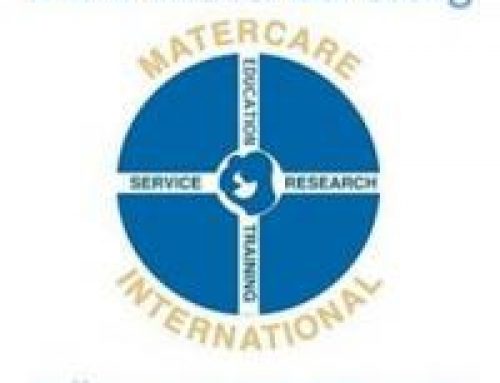5 years later: What Pope Francis said to MaterCare & the FIAMC
It has been 5 years since Pope Francis addressed the conference audience of MaterCare International and the FIAMC in Rome. Perhaps his words are even more impactful today.

Please find below an English translation of the Papal audience (source: http://www.catholic.org/hf/family/story.php?id=52468)
ADDRESS OF HIS HOLINESS:
I apologize for the delay, because today … this is a morning was very complicated for audiences … I apologize.
1. The first point that I would like to share with you is this one: we are witnessing today a paradoxical situation confronting the medical profession. On the one hand we see–and we thank God for it–the progress of medicine, thanks to the work of scientists who, with passion and without expectation of return, are dedicated to finding new cures. On the other hand, however, we also confront the danger that the physician is losing his identity as a servant of life. The cultural disorientation has also affected that which looked like an unassailable area: your practice, medicine! Although by their nature at the service of life, the health professions are sometimes induced to disregard life itself. Instead, as we recall from the encyclical Caritas in Veritate, “openness to life is at the center of true development.” There is no true development without this openness to life. If one loses the personal and social sensitivity towards the acceptance of a new life, then other forms of acceptance that are valuable for society also wither away. The acceptance of life strengthens moral fiber and makes people capable of mutual help.”(No. 28). The paradoxical situation is reflected in the fact that, while new rights are accorded to persons, sometimes even presumed rights, life is not always protected as a primary value and basic right of every man. The final objective of the physician is always the defense and promotion of life.
2. The second point: in this contradictory context, the Church appeals to the conscience, the conscience of all health care professionals and volunteers, and in a particular way to you Gynecologists, who are called to collaborate in the creation of new human lives. Yours is a unique vocation and mission, which requires study, conscience and humanity. At one time, we called those women who helped in childbirth “comadre,” [co-mothers] as if she was like a mother to the other, with the real mother. You too are “comadri” and “compadri” [co-mothers and co-fathers], especially you.
A widespread mentality of uility, the “culture of waste,” which now enslaves the hearts and minds of many, comes at a very high cost: it requires the elimination of human beings, especially those who are physically or socially weaker. Our response to this mentality is a decided and unhesitating “yes” to life. “The first right of the human person is his life. He has other goods and some of them are very precious, but life is the fundamental good condition for all others.”(Congregation for the Doctrine of the Faith, Declaration on Procured Abortion, November 18, 1974, No. 11). Things have a price and are sold, but people have a dignity, worth more than things and are priceless. Many times, we find ourselves in situations where we see life being devalued. For this reason, in recent years attention to human life in its totality has become a real priority of the Magisterium of the Church, particularly in regard to the most defenseless, that is, the disabled, the sick, the unborn, the child, the elderly, those whose life is most defenseless.
The human fragility in each of us is invited to recognize the face of the Lord, who in his human flesh experienced the indifference and loneliness that often condemn the poorest, both in countries in the developing world, and in affluent societies. Every child not allowed to be born, but unjustly condemned to be aborted, has the face of Jesus Christ, the Lord’s face, inasmuch as before he was born, and while born, he experiences the rejection of the world. And the elderly, and–I talked about the child: let us go to the elderly, another point! And every elderly, sick, or every person if at the end of his days, carries the face of Christ. You can not discard the “culture of waste” proposes! You can not discard so!
3. The third aspect is a commandment: be witnesses and speakers of this “culture of life.” Your being Catholic entails greater responsibility: first of all to yourself, for the effort to be consistent with the Christian vocation, and then to contemporary culture, to help recognize the transcendent dimension in human life, the imprint of the creative work of God, from the very first moment of her conception. This is a commitment to the new evangelization that often requires going against the current, paying the cost in person. The Lord counts on you to spread the “Gospel of Life.”
In this perspective, gynecological hospital departments are privileged places of witness and evangelization, because wherever the Church, “the vehicle of the presence of God,” is found, there is also at the same time found the “instrument of the true humanization of man and the world” (Congregation for the Doctrine of the Faith, Doctrinal Note on Some Aspects of Evangelization, No. 9). Growing awareness that the focus of medical care is the human person in a position of weakness, the health facility becomes “a place in which the relationship of treatment is not a profession but a mission; where the charity of the Good Samaritan is the first seat of learning and the face of suffering man is Christ’s own Face.” (Benedict XVI, Address at the Catholic University of the Sacred Heart in Rome, May 3, 2012).
My dear friends and physicians, you who are called to take care of human life in its initial phase, remind everyone, with your actions and your words, that life is always, in all its phases and at any age, sacred and is always of this quality. And not as a matter of faith–no, no–but of reason, as a matter of science! There is no human life more sacred than another, just as there is not a human life qualitatively more significant than another. The credibility of a health care system is measured not only by efficiency, but also by the attention and love towards the person, whose life is always sacred and inviolable.
Do not ever neglect to pray to the Lord and the Virgin Mary for strength to do your task well and bear witness with courage–courage! Today it takes courage–courage to witness to the “Gospel of life”! Thank you very much.









